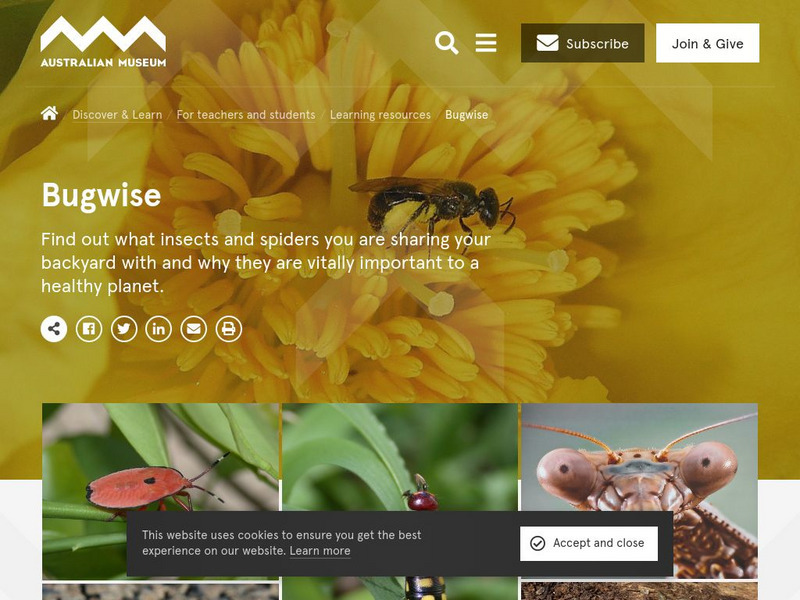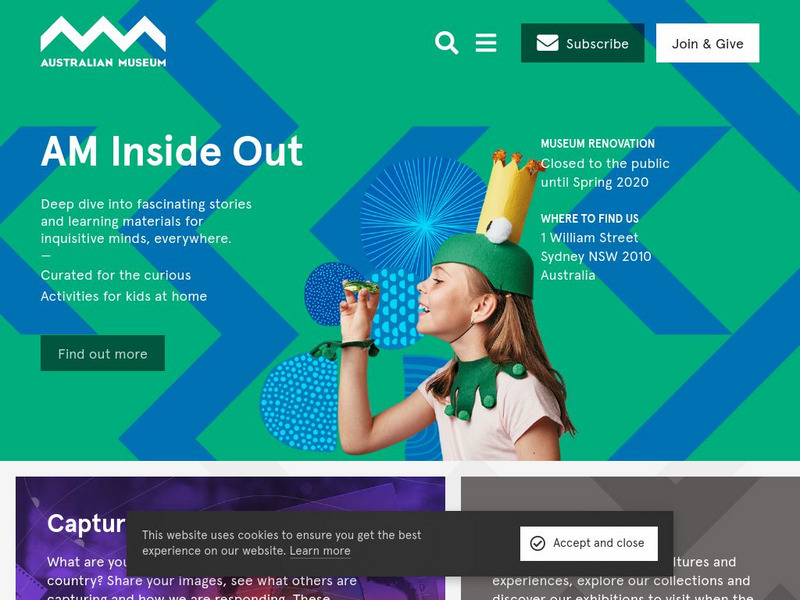Hi, what do you want to do?
Smithsonian Institution
National Museum of Natural History: Department of Invertebrate Zoology
Search the Invertebrate Zoology Collection, and read about original research performed on all 30 major invertebrate animal phyla except insects.
Australian Museum
Australian Museum: Bug Wise
Explore the diverse world of invertebrates. Learn what they are, what they do, and how they contribute to our planet. This site offers "BugWise News", a forum, an invertebrate guide, and a wide range of great resources and activities.
Other
Black Hills Institute of Geological Research, Inc.: Ammonoids
Ammonoids, more commonly referred to as Ammonites, are the extinct ancestors of today's octopus, squid and nautilus. This page provides excellent information about these creatures, as well as diagrams and pictures.
PBS
Pbs: Nature: The Fascinating World of Jellies
Learn about the mysterious jellyfish blooms that have occurred in the world's oceans. Because the resulting alteration to the marine food web has had devastating effects, researchers grow and study jellyfish at the Monterey aquarium....
Australian Broadcasting Corporation
Australian Broadcasting Corporation: News in Science: Sea Urchins Are Part Human
From ABC News in Science, this article discusses research connected to the possibility that despite their qualities of brainless, limbless, and invertebrates, sea urchins are actually similar to humans.
Indiana University
Indiana Univ. Bloomington:geo Notes: Conodonts: Microfossils of Distinction [Pdf]
Presents some facts about conodonts, extinct eel-like animals whose fossils have been found in Indiana's marine sedimentary rocks. Their important role in geologic research is also discussed.
University of Florida
Florida Museum of Natural History: Homepage
This site from the Florida Museum of Natural History gives the current events, information about the museum, exhibits and public programs, research and collections, links, etc. to the Florida Museum of Natural History.
Science Education Resource Center at Carleton College
Serc: Investigating Macroinvertebrates: How Clean Is Our Lake?
In this outdoor field study, students will collect and identify as many types of macro invertebrates that they find in Lake Bemidji using an identification key. Additionally students will create investigable questions regarding the macro...
Australian Museum
Australian Museum Society: Arthropods
A description of what arthropods actually are and a discussion of their origin, as well as some info on research.
National Science Foundation
National Science Foundation: Fluorescent Coral
Justin Marshall researches fish and invertebrate color vision, color communication, and visual ecology of coral reefs and other habitats. He photographed this fluorescent coral under fluorescent lighting conditions
PBS
Idaho Ptv: Dialogue for Kids: Zoology
A collection of facts and links on the field of zoology. The facts cover what zoology is, the diversity of vertebrate and invertebrate animals studied in zoology, scientific names for animals, where zoologists work, zoos around the...
Australian Museum
The Australian Museum
This site features links to information on Australia's museum.
Curated OER
Smithsonian Institution Archives: Libbie Henrietta Hyman (1888 1969)
Libbie Henrietta Hyman (1888-1969) graduated from the University of Chicago in 1910 and earned a Ph.D. degree from Chicago in 1915. She stayed at the university with an appointment as a research assistant until 1931 because, despite her...
Curated OER
Bodil Mimi Krogh Schmidt Nielsen (B. 1918) With Her Children
Bodil Mimi Krogh Schmidt-Nielsen (b. 1918), with her children (left to right) Mimi (age 5), Bent (age 9), and Astrid (age 11). They are shown examining study materials to be taken on an African expedition. The caption provided with the...
American Museum of Natural History
American Museum of Natural History: Annelida
Basic facts about segmented worms: their size, number of species, where they typically live, ecological roles, and human uses.














